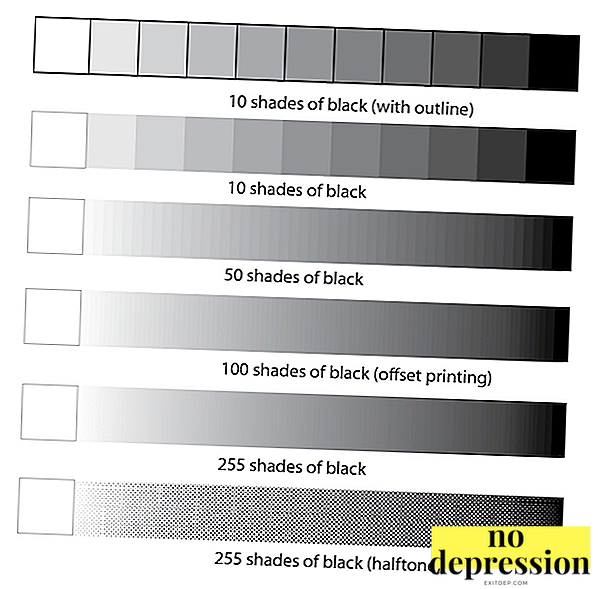Human life is determined by a number of factors. Some of them are laid before birth. First of all, we are talking about temperament, which forms a person's attitude towards himself and the world around him. Types of temperament sometimes differ so much that people may not find a common language. The description of temperaments has been done for a very long time, and modern studies have only completed this picture. If you correctly identify the type of temperament, then you can more effectively achieve your life goals. Let us examine 4 types of temperament and think about how this knowledge is best applied.
Types of human temperament
Even in ancient Greece, scientists and philosophers drew attention to the psychological differences between people who in the same situations acted completely differently. Having carefully analyzed the behavior of his compatriots, the ancient Greek physician Hippocrates identified 4 types of temperament: phlegmatic, melancholic, choleric and sanguine. This classification was explained the dominance of one of the "vital juices".
Thus, in phlegmatic persons, in the opinion of the ancient Greeks, lymph prevailed (reflux), which makes them calm, balanced, inert. The temperament of choleric is caused by exposure to bile (chole), due to which they are prone to outbursts of anger. The causes of melancholic depression in black bile (melena chole). This "life juice" fills with sadness and fear. If blood prevails (sangua), then the person will be cheerful, active, cheerful. This description corresponds to the sanguine person.
The division into such types of temperaments is firmly rooted in society. The ancient Roman physician Galen refined the teaching of Hippocrates that there are 4 types of people. Despite the fact that he lived for half a millennium later, the determination of the type of temperament also occurred at an intuitive level, since many characteristics of the higher nervous activity of man had not yet been discovered.
In this form, the description of temperaments, almost unchanged, came to the twentieth century, when psychologists and physiologists became interested in this phenomenon. So, thanks to Ivan Petrovich Pavlov, the characteristic of temperament types supplemented by an understanding of the characteristics of the nervous system. Now, for a more effective definition, indicators such as strength, mobility and balance of higher nervous activity were used. The researcher identified one weak (melancholic) and three strong (sanguine, choleric, and phlegmatic) types. If we talk about mobility, then only the phlegmatic was inert. Imbalance distinguished type of temperament choleric.
The Swiss psychiatrist Carl Gustav Jung, describing temperament, studied in detail the influence of psychological functions on him: sensations, feelings, thinking, intuition. He compared the types of human temperament with behavior, introducing the concepts of extraversion (orientation to the outside world) and introversion (immersion in oneself). Choleric and sanguine were prone to the first, and phlegmatic with melancholic - to the second. Although this division is conditional.
The types of temperament and their psychological characteristics were seriously studied by the British scientist Hans Jürgen Aysenck. According to him, temperament, in addition to extraversion and introversion, depends on the emotional stability of the individual. Having systematized all the available information, he created a unique method of high-precision personality testing, which was later called the Eysenck temperament test. This approach allows you to determine the type of temperament, as well as its severity in a person’s personality. Why it is so important, let's talk in the next section.
How to determine the type of temperament and why?
The difficulty in communication between people very often appears due to the fact that they have different temperaments. Accordingly, it is much easier to establish a dialogue or select a suitable interlocutor if you determine the type of temperament. Finding your affiliation is not so difficult. To do this, just allocate five minutes of time to temperament test on our website, which will let you know what type of temperament you are.
To analyze the interlocutor, have to spend more time. The psychological characteristic of the types of temperament will serve as a good cheat sheet. So, 4 types of temperament and their brief description:
- Sanguine - energetic and active, with increased efficiency and a positive outlook on the world;
- Choleric - quick-tempered, emotional, impulsive, prone to leadership and domination;
- Melancholic - vulnerable, impressionable, sincere, worries for any reason for a long time, knows how to fantasize;
- Phlegmatic person - calm, balanced, inert, weakly interacting with other people.
This characteristic helps to form a general idea of a person, but it is far from exhaustive. Rare types of pure temperament. Basically, in a person can be represented by the makings of several temperaments, they are just differently expressed. Depending on the situation or life circumstances, the sanguine person sometimes turns into phlegmatic, melancholic into choleric, etc.
Nevertheless, trying to understand the type of temperament of the interlocutor is very important, because it will help to avoid a number of "pitfalls". And, if you also understand your type, then in general the level of communication will rise to unexpected heights.
On how to build relationships or dialogue with each specific type of temperament, we have analyzed in detail in thematic articles about choleric, sanguine, melancholic and phlegmatic, which are published on our website. But it is desirable not to forget that each person is individual. Do not put "stamps" and "stamps" at all without parsing. Education and social environment can significantly adjust the person's identity. A choleric person can grow up to be a well-mannered person, a phlegmatic person can be very inquisitive, a sanguine person can distinguish himself by an enviable constancy, and a melancholic person can win a boxing championship.
The types of temperament listed in the article are simple in perception, but, at the same time, quite comfortable. Apparently, this is the secret of their popularity for several millennia. The type of temperament determines the life of a person, but other factors play a big role. So, determining the type of temperament is akin to a hint, but not a strict guide to action. Everything in the world is relative, from the speed of light to the typing of people.



